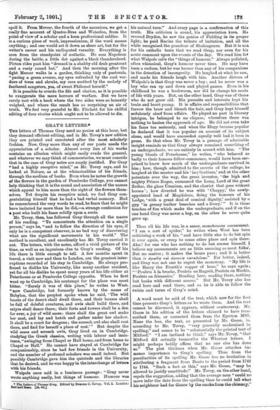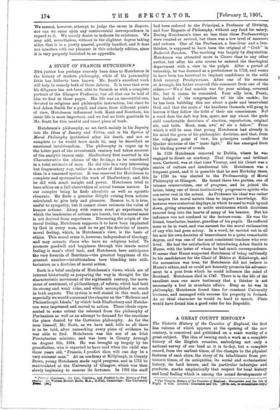GRAY'S LETTERS.*
THE letters of Thomas Gray need no praise at this hour, but they demand efficient editing, and in Mr. Tovey's new edition they are printed and annotated after the most scholarly fashion. Now, Gray more than any of our poets needs the appreciation of a scholar. Almost every line of his works contains an allusion which might easily evade the general, and whatever we may think of commentaries, we must concede that in the case of Gray notes are amply justified. For Gray " had a highly receptive mind," as Mr. Tovey says, and he looked at Nature, as at the whimsicalities of his friends, through the medium of books. Even when he notes the growth of the flowers in the garden of Pembroke College, you cannot help thinking that it is the sound and association of the names which appeal to him more than the sight of the flowers them- selves. Yet despite his receptive mind, we find Gray con- gratulating himself that he had a bad verbal memory. Had he remembered the very words he read, he fears that he might have imitated far more than he did,—a strange confession for a poet who built his fame solidly upon a cento.
Mr. Tovey, then, has followed Gray through all the mazes of his reading. " To concentrate the attention on a single person," says he, " and to follow the direction of his eyes, if only he is a competent observer, is no bad way of discovering what are the significant movements in his world." The method is excellent, and excellently has Mr. Tovey carried it out. The letters, with the notes, afford a vivid picture of the time, as well as an ingenious clue to Gray's reading. Of his life there is little enough to tell. A few months spent in travel, a visit now and then to London, are the greatest inter- ruptions recorded of his stay in Cambridge. He always pro- fessed to dislike his University, like many another resident, yet for all his dislike he spent many years of his life either at Peterhouse or at Pembroke College opposite. When he first went up to Cambridge, his contempt for the place was most bitter. "Surely it was of this place," he writes to West, "now Cambridge, but formerly known by the name of Babylon, that the prophet spoke when he said, The wild beasts of the desert shall dwell there, and their houses shall be full of doleful creatures, and owls shall build there, and satyrs shall dance there; their forts and towers shall be a den for ever, a joy of wild asses: there shall the great owl make her nest, and lay and hatch and gather under her shadow. It shall be a court for dragons ; the screech owl also shall rest there, and find for herself a place of rest.' " But despite the wild asses and screech owls, Gray lived on in Cambridge, studying the Greek classics, writing with labour and insis- tence, "swinging from Chapel or Hall home, and from home to Chapel or Hall." He cannot have stayed at Cambridge for companionship, since he had few friends in the University, and the number of profound scholars was small indeed. But possibly Cambridge gave him the quietude and the libraries that he desired, and he was happy in the interchange of letters with his friends.
Walpole once said in a luminous passage : " Gray never wrote anything easily, but things of humour. Humour was
• Tha LAW' of Thomas Gray. Edited by DIM= C. Toney. Vol. L London: Bell and Boas. [3s. Odj his natural turn." And every page is a confirmation of this truth. His criticism is sound, his appreciation keen. He revered Dryden, he saw the genius of Fielding in its proper light; he paid Racine the tribute of imitation, and all the while recognised the grandeur of Shakespeare. But it is not for his catholic taste that we read Gray, nor even for his acute comment upon the events of the day. We read him fol what Walpole calls the "things of humour." Always polished, often whimsical, Gray's humour never tires. He may have been a recluse, but he was keener than any of his companions in the detection of incongruity. He laughed at what he saw, and made his friends laugh with him. Another dictum of Walpole's is that Gray was never a boy ; and he never was a boy who ran up and down and played games. Even in his childhood he was a bookworm, nor did he change his mode of life with years. But, on the other hand, Gray was of those who do not grow old. His pursuits and interests kept his brain and heart young. It is affairs and responsibilities that furrow the brow and blanch the hair, and Gray kept himself sedulously aloof from affairs. He played no part in literary intrigue, he belonged to no cliques ; wherefore there was nothing to hasten the approach of age. He did not even take his fame too seriously, and when the Elegy became popular he declared that it was popular on account of its subject alone, and would have succeeded equally well had it been in prose. So that when Mr. Tovey in a passage of admirable insight reminds us that Gray always remained something of an undergraduate, we are entirely in accord with him. " The young bloods of Peterhouse," he writes, " who behaved so badly to their famous fellow-commoner, would have been sur- prised to know how much of the undergraduate survived in him ; how, though admitted to the secrets of the college, he laughed at the master and his imrlications,' and at the other potentate over the way, the great inventor, the high and mighty Prince Roger, surnamed the Long, Lord of the great Zodiac, the glass Uranium, and the chariot that goes without horses' ; how diverted he was with Chappy,' the newly- appointed head of Magdalene, doing the honours of his Lodge, with a great deal of comical dignity,' assisted by a gyp ' in greasy leather breeches and a livery.' " It is these touches of fun which make the undergraduate, and if on the one hand Gray was never a boy, on the other he never quite grew up.
Thus all his life was, in a sense, monotonous amusement. " I am a sort of spider," he writes when West has been criticising a work of his, " and have little else to do but spin it over again, or creep to some other place and spin there. Alas ! for one who has nothing to do but amuse himself, I believe my amusements are as little amusing as most folks'. But no matter ; it makes the hours pass ; and it is better than i cipadicc ?cal ci.uova4 KivrecAlLyal." Far better, indeed, and Gray was not one to regret the monotony. "My life is like Harry the Fourth's supper of hens," he says again ; " Poulets b, la broche, Poulets en Ragoiit, Poulets en Hachis, Poulets en fricassees.' Reading here, reading there, nothing but books with different sauces." But Mr. Tovey also has read here and read there, and so be is able to follow the twists and turns of Gray's mind.
A word must be said of the text, which now for the first time presents Gray's letters as he wrote them. And the text cannot be discussed, it appears, without controversy. Mr. Gosse in his edition of the letters claimed to have tran- scribed them, or corrected them from the Egerton MSS. None the less, the text, as presented by Mr. Gosse, is, according to Mr. Tovey, " very generally modernised in spelling," and seems to be " substantially the printed text of Mitford." " I am inclined to think," says Mr. Tovey, " that Mitford did actually transcribe the Wharton letters. I might perhaps boldly affirm that no one else has done so." The plot thickens when Mr. Gosse attaches im- mense importance to Gray's spelling. Thus from the peculiarities of its spelling Mr. Gosse has no hesitation in attributing a fragment from Dante to the period from 1742 to 1744. "Such a fact as this," says Mr. Gosse, "may be allowed to justify exactitude." Mr. Tovey, on the other hand, repels the suggestion, adding that the average man " could no more infer the date from the spelling than he could tell what his neighbour had for dinner by the smoke from the chimney," We cannot, however, attempt to judge the cense in dispute, nor can we enter upon any controversial correspondence in regard to it. We merely desire to indicate its existence. We may add, nevertheless, without in the slightest degree taking sides, that it is a pretty quarrel, prettily handled, and it does not interfere with our pleasure in this scholarly edition, since it is very properly banished to an appendix.



































 Previous page
Previous page